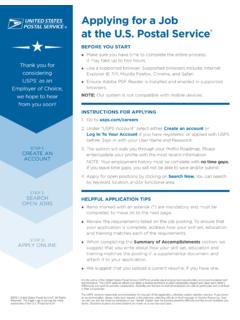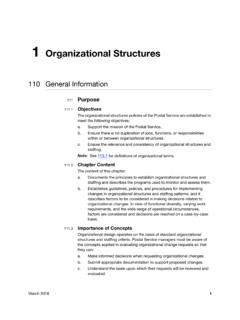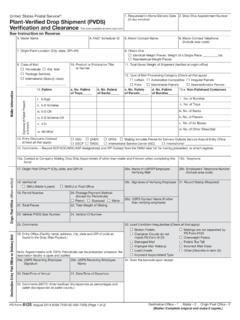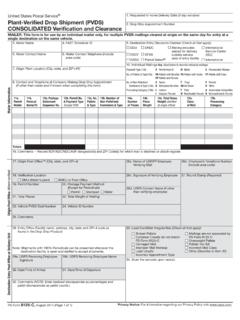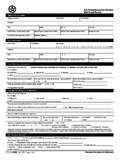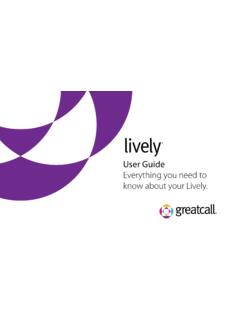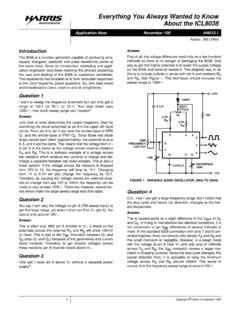Transcription of WHAT YOU NEED TO KNOW ABOUTEEO - USPS
1 what YOU NEED TO know ABOUTEEOP ublication 133 October 2012 what YOU NEED TO know about EEOP ublication 133 October 20122 | October 2012 Publication 133 what You Need To know about EEOC ontentsIntroduction 3 EEO Laws 4 Administrative Process for Complaints of Illegal Discrimination 5 Formal EEO Complaint Process 10 Requesting a Final Postal Service Decision or an EEOC Hearing Before the Postal Service Issues a Final Action 14 Appealing the Decision or Filing a Civil Action 16 Age Discrimination in Employment Act Cases 18 Equal Pay Act Cases 21 Mixed EEO and Merit Systems Protection Board Cases 21 Withdrawals and Settlements 25 Remedies 26 Publication 133 October 2012 | 3 what You Need To know about EEOI ntroduction This booklet provides an overview of the Equal Employment Opportunity (EEO) laws and the EEO complaint process for the Postal Service It explains your rights, responsibilities, and remedies under those laws and the EEO complaint process Please read it carefully Although this booklet contains important information, it does not include all information on discrimination complaint laws or EEO complaint processing regulations Title 29 Code of Federal Regulations (CFR) Part 1614 contains the regulations on EEO complaint processing for federal agencies, including the Postal Service These regulations are administered by the Equal Employment Opportunity Commission (EEOC)
2 You can obtain complete copies of the EEO laws and 29 CFR 1614 on the Internet at booklet also provides an explanation of the REDRESS program REDRESS, an alternative dispute resolution process, may offer you an opportunity to request mediation in addition to traditional EEO counseling Detailed information about REDRESS is available on the Internet at 4 | October 2012 Publication 133 what You Need To know about EEOEEO LawsThe following statutes, which are enforced by the EEOC, make it illegal to discriminate against employees or applicants for employment on the basis of race, color, religion, genetic information, national origin, sex, age (40+), or physical or mental disability In addition, a person who files an EEO complaint, participates in an investigation of an EEO complaint, or opposes an employment practice made illegal under any of the statutes enforced by the EEOC is protected from retaliation Equal Pay Act of 1963 The Equal Pay Act (EPA)
3 Prohibits sex-based wage discrimination The EPA prohibits agencies from paying employees of one sex lower wages than those of the opposite sex for equal work performed under similar working conditions Title VII of the Civil Rights Act of 1964, as AmendedTitle VII prohibits discrimination based on race, color, religion, sex, or national origin Title VII also prohibits reprisal or retaliation for taking part in the discrimination complaint process or for opposing any unlawful employment practice under its authority Age Discrimination in Employment Act of 1967, as AmendedThe Age Discrimination in Employment Act (ADEA) prohibits discrimination in employment based on age (40 years or older) Sections 501 and 505 of the Rehabilitation Act of 1973, as AmendedSections 501 and 505 of the Rehabilitation Act prohibit discrimination based on mental and physical disability and require agencies to reasonably accommodate the known physical or mental limitations of qualified employees or applicants with disabilities Publication 133 October 2012 | 5 what You Need To know about EEOC ivil Rights Act of 1991 The Civil Rights Act of 1991, among other things, provides monetary damages up to $300,000 in cases of intentional employment discrimination Genetic Information Nondiscrimination Act of 2008 The Genetic Information Nondiscrimination Act (GINA)
4 Protects applicants and employees from discrimination based on genetic information GINA also restricts employers acquisition of genetic information and strictly limits disclosure of genetic information Administrative Process for Complaints of Illegal Discrimination Precomplaint Process If you are a Postal Service employee or applicant for Postal Service employment and believe you have been discriminated against because of your race, color, religion, genetic information, national origin, sex, age (40+), physical or mental disability or in retaliation for involvement in protected EEO activity, you have the right to file an EEO complaint with the Postal Service You must take part in the EEO precomplaint process before filing a formal EEO complaint The purpose of the precomplaint process is to advise you of your rights and responsibilities under the EEO process, to identify your claims, and to try to resolve the matter informally Beginning the EEO Process in a Timely Manner To begin the precomplaint process, you must contact the Postal Service Equal Employment Opportunity Office using the central toll-free telephone number within 45 calendar days of the alleged discriminatory action, or in the case of a personnel action, within 6 | October 2012 Publication 133 what You Need To know about EEO45 calendar days of the effective date of the action See 29 CFR 1614 105 The central telephone number is.
5 888-EEO- usps (888-336-8777) TTY: 888-325-2914 When you call, an automated answering system will ask you to give your name, social security or employee identification number, home (mailing) address, telephone number, and finance number A packet of information that includes PS Form 2564-A, Information for Precomplaint Counseling, will be mailed to you Once you receive and read the information packet, you should decide if you want to move forward with the complaint process If you decide to do so, you should send back all relevant forms within 10 calendar days after you received them to the address listed in your information packet After you return the forms, an EEO Alternative Dispute Resolution (ADR) Specialist will contact you and continue the precomplaint process as described in this booklet If you fail to return the forms within 10 calendar days of receiving them, the EEO office may close the precomplaint process because the EEO ADR Specialist does not have enough information to process your counseling request Representation You may designate a representative at any stage of the complaint process, including the precomplaint counseling stage However, your designation of a specific representative may not cause unreasonable delay to the EEO process or unwarranted expense to the Postal Service Further, the designation of a representative that may create a conflict of interest may not be allowed You must designate your choice of a representative in writing Publication 133 October 2012 | 7 what You Need To know about EEOO fficial Time Employee complainants and their designated representatives.
6 If also employed by the Postal Service, may expect a reasonable amount of official time to present the complaint and to respond to agency requests for information, if they are in a duty status The term duty status refers to an employee s normal hours of work what constitutes a reasonable amount of official time may vary from case to case However, with regard to preparation time, reasonable refers to hours or portions of hours Employees seeking official time for EEO-related matters must receive advance approval from their immediate supervisors If Postal Service officials or EEOC officials require their attendance, employee complainants and their designated employee representatives may attend EEO meetings or hearings on official time Postal Service employees seeking official time to attend an EEO meeting must present written requests within a reasonable amount of time to their immediate supervisors before the scheduled meeting Maintaining Anonymity You may remain anonymous during the precomplaint process If you request anonymity, the EEO office will honor your request However, in some instances, such as certain harassment cases, the EEO office is required to divulge information regarding your precomplaint to human resources and/or other appropriate officials Taking Part in the Precomplaint Process Counseling The EEO ADR Specialist explains the EEO complaint process including time frames, your rights and responsibilities in the process.
7 And appeal procedures The EEO ADR Specialist also works with you to identify and define your claim(s) Your claim(s) is(are) the action(s) that caused you to believe you were discriminated against In addition, the EEO ADR 8 | October 2012 Publication 133 what You Need To know about EEOS pecialist explains your option to engage in REDRESS mediation during the precomplaint process See the next section for more information about REDRESS The EEO ADR Specialist is a neutral party and is not permitted to act as an advocate for either you or the Postal Service The EEO ADR Specialist conducts informal counseling inquiries and does not usually obtain extensive documentation or written testimony The EEO ADR Specialist generally conducts EEO counseling by telephone, but may conduct it by mail or in person During counseling inquiries, the EEO ADR Specialist usually communicates separately with you and the other party in the dispute However, if both parties agree.
8 The EEO ADR Specialist may communicate or meet with you and the other party at the same time The EEO ADR Specialist makes necessary inquiries of Postal Service employees and supervisors He or she also reviews relevant agency regulations and documents, including comparative employee data, to help him or her understand the issues and resolve the matter The EEO ADR Specialist cannot reveal the identity of the comparative individuals The goal of counseling is an agreeable resolution to the issue In trying to resolve your dispute, the EEO ADR Specialist may discuss settlement alternatives with you and the representative of the Postal Service Settlement discussions are confidential A willingness to discuss resolution does not suggest that either party feels that his or her position is wrong or weak If the matter is not resolved within 30 calendar days from the date on which you first called the central toll-free telephone number seeking EEO counseling, the EEO ADR Specialist may ask you to agree to extend the counseling period The extension cannot be longer than 60 calendar days, resulting in no more than 90 total calendar days in the counseling period Your agreement to extend the counseling period must be in writing Publication 133 October 2012 | 9 what You Need To know about EEO If the matter is not resolved at the end of the counseling period, including the extended period (if you have agreed to it)
9 , the EEO ADR Specialist conducts a final interview and issues you a notice of right to file a formal complaint The notice is generally issued by mail REDRESS A Conflict Resolution Process When you seek EEO counseling, the EEO ADR Specialist will tell you about REDRESS, an alternative dispute resolution process that provides an opportunity for you and the appropriate management official to discuss your complaint with the help of a professionally trained mediator REDRESS mediators are not employees of the Postal Service REDRESS mediators help the parties to identify the core issues of their dispute and explore possible solutions Employees usually find this opportunity for direct communication and conflict resolution satisfying and effective Your participation in REDRESS is voluntary and may be done on the clock The Postal Service pays the cost of the mediator The mediator keeps everything said in mediation confidential Some issues are not appropriate for REDRESS The EEO office will tell you when the issue you have raised is inappropriate When the EEO ADR Specialist offers you the option to take part in REDRESS and you agree in writing to do so.
10 The precomplaint processing period is 90 calendar days from the date of your initial contact with the EEO office If the matter is not resolved within 90 calendar days, the EEO ADR Specialist issues you a notice of your right to file a formal complaint You may have discussed many issues during your REDRESS mediation session, but only those issues that you included in your timely request for EEO counseling and discussed with the EEO ADR Specialist may be included in a formal EEO complaint 10 | October 2012 Publication 133 what You Need To know about EEOF ormal EEO Complaint Process Losing Your Right to Anonymity If you decide to file a formal EEO complaint, your identity will not be kept confidential during the formal complaint process When a complaint reaches the formal stage, the complaint file may be opened to those parties who are involved and who require access to it Filing a Formal EEO Complaint in a Timely Manner To file a formal complaint, you must put your complaint in writing and sign it Your attorney, if one represents you, may sign it instead If someone who is not an attorney represents you, you must sign the complaint yourself and designate your representative in writing EEOC regulations require that EEO complaints against the Postal Service must be filed with the Postal Service You may use PS Form 2565, EEO Complaint of Discrimination in the Postal Service, to file your formal EEO complaint To be timely, you must mail your formal EEO complaint to the National Equal Employment Opportunity Inv
